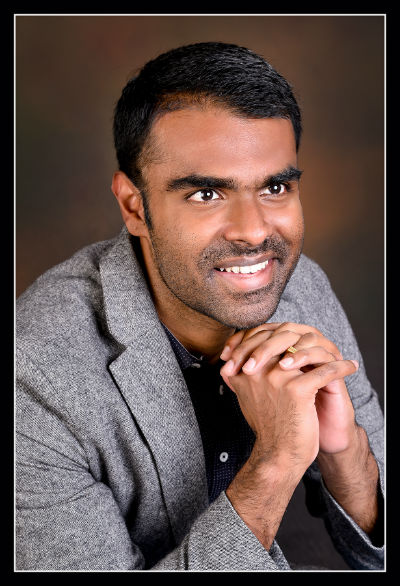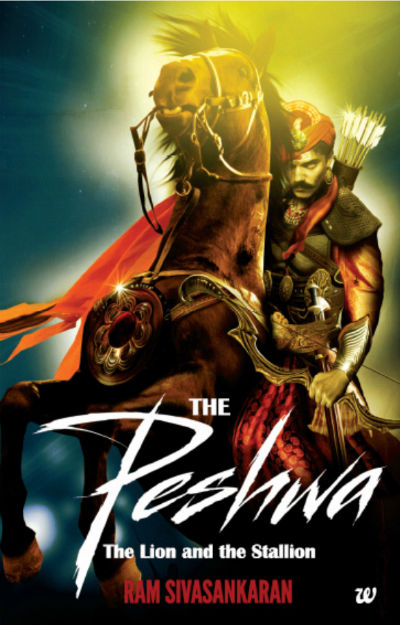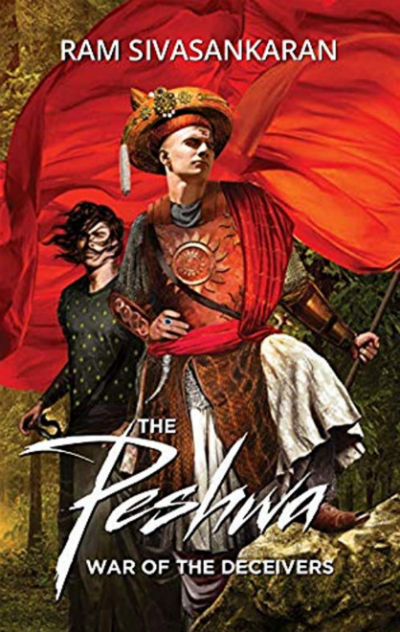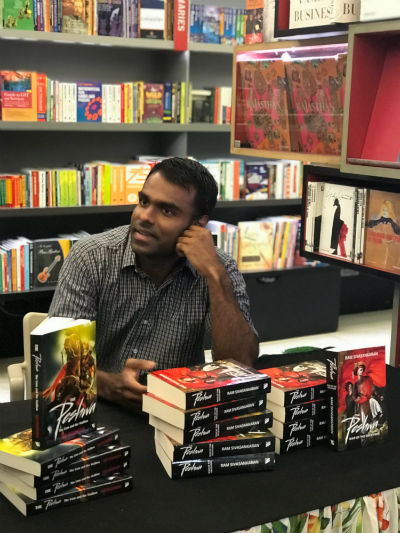Hi Friends,
Allow me to introduce Ram Sivasankaran, a techie by qualification and author by passion. Though he was born in Madras (now Chennai), India, he has spent most of his growing up days in Oman. He was exposed to NCERT books while studying and was very keen to know the real aspects of the history rather than whatever is presented.
Peshwa Bajirao is one of the most remarkable warriors who died young but his skills make him one of the most unmatched warriors and especially commandant in modern history. Fascinated with Bajirao, Ram decided to pen down his vision about the possible life of Peshwa and the timings he lived in. This is how the idea of “The Peshwa: The Lion and The Stallion” is conceived.

Ram Sivasankaran – The Author Of – The Peshwa – Book Series
The book acquired both commercial and critical success and after a few years, Ram came up with the sequel of the same “The Peshwa: War of Deceivers”. Reading Ram’s book is an interesting experience in its own. You can find our detailed views and reviews for his books at:
- The Peshwa: The Lion and The Stallion by Ram Sivasankaran
- The Peshwa: War of the Deceivers by Ram Sivasankaran
The way the book is written, made us curious to know more about Ram and his vision about various things including his book(s), of course. And, what could have been better than an Author Interview?! Fortunately, the things worked out in positive ways and I got a chance from our team to have a Q/A session with him.
Here it is.
Greetings from team ThinkerViews…!
We are glad to have a conversation with you. Thank you for sparing some time to have a Q/A session with us. Your books are doing pretty well. Can you share your feelings?
I am happy, of course. My aim as a writer is to tell a good story. In cases of series like this, there is always an expectation from readers that the sequel should equal or surpass the original in story and narration. I am happy, for now, that The Peshwa – War of the Deceivers is being received just as well if not better than The Peshwa – The Lion and the Stallion. It is a very humbling experience.
Absolutely. It is a bit unfortunate that, in today’s corporate culture, we live in a day and age where one’s self worth is judged by her or his ability to serve others. Oftentimes (but not always), our passions conflict with the ability to put food on our plates. It is especially so for writers. In this day and age, it is not too difficult to get a book in print, so there is immense competition for shelf space and sales. Even the strongest and the best among the lot go unnoticed if others have greater marketing abilities and reach. However, the very act of writing a book and getting a handful of positive reviews and patrons is what makes the experience worth having.
I am an aerospace engineer by academic qualification and a product manager in financial technology by profession. My passions include building and delivering great products for my customers, keeping my family happy and secure, and, occasionally, writing. Fairly simple! I also have immense love and affinity for Vedic/Hindu philosophy and Indian history.
Some people are great orators and public speakers. Words and thoughts flow spontaneously, coherently, persuasively and beautifully through their lips. I, on the other hand, am not of that ilk. I consider my thoughts too chaotic and messy to make coherent or good speech. However, when I write, I have the time to size up, embellish and present my words like an artist who has worked on a canvas for a long time. It’s just that, from a very young age, I have used writing as a substitute for direct speaking wherever I can. An introvert as I am it helps bring up my most soulful thoughts in a manner that my speech never could.
I have indeed answered this question more times than I can remember. I have offered several long-winded answers to this question, but the crux of them all is – Bajirao was, and to an extent, still is, an obscure and less-sung hero to the majority of India. In fact, the whole of the Maratha Empire has been treated like some kind of anti-Mughal rebel faction in our history textbooks, many of its leaders effectively consigned to the dust with either sparse or no academic literature available to honor their memories. I dream of writing books – many of them – that can bring to life some of these conveniently and easily forgotten heroes from our past. Bajirao just happened to be the first of them because of my perception of his invincibility in battle and being one of the first instruments that worked at converting Chhatrapati Shivaji’s dream of Svaraajya to Saamraajya.
It is true that there are more ‘sources’ to research Mughal and British history. In fact, our schools are inundated with material talking copiously about these powers whereas there are very few that focus on equally (if not more) spectacular and overtly more egalitarian powers like Vijayanagara and the Maratha Empire. Many of the works on even the British and the Mughals are irrevocably tied to the biases of the historian. Without naming names, I even hear that there is a foreign historian enamored enough by Augrangzeb to write a dazzling account on his life – even going on to portray him as some kind of a saint even though many accounts document his deeds as religiously fanatical and monstrous. Therefore, picking sources authored by the right subject experts is the first and most crucial step to use as a base, even for the sake of penning a work of fiction. The second most important thing, at least for me, is not to compete in the space of lifetime historians myself. As you said, I want to weave elements of fact and fiction to tell a good story – one that is hopefully good enough to inspire others to read the real history.
Of course! There are many to whom the accurate portrayal of history is crucial, even in fiction. This is an oxymoron of sorts, for something that has been designated as fiction cannot be expected to be factually accurate. Although sticklers of this sort may not find my way of storytelling savory, I unite with them with respect to the end objective – the dissemination of truth with regard to less-known stalwarts. While my critics prefer to lay the truth threadbare before their audience, I try to coax the audience towards such an interest – one that can hopefully come from reading a good historical novel.

The Peshwa: The Lion and The Stallion by Ram Sivasankaran | Book Cover
I loved writing the part where Peshwa Balaji Vishvanath springs his first surprise on the Mughals. I think this way of military deception will be a recurring theme in my works, as much as it was a trend in those days.

The Peshwa: War of the Deceivers by Ram Sivasankaran | Book Cover
I will keep it brief. I will say – follow every word for clues. Trust no one.
I would think I am one of the latter. I may go without writing for days or weeks on end in search for inspiration. But once I start writing, I could be tied down with it for comparable periods of time. I usually try to make the best of my train commute when I write. Sometimes, I wake up very early in the morning to write, when my creativity is at its best, before getting ready to go out to work.
For both Peshwa I and II, I asked to be fairly involved in the cover design, and the publisher was gracious enough to accommodate. What I would do is – I would try to paint the cover in words, and the illustrator would give life to it. There would be a few backs-and-forths before we could agree. Despite the cover being reflective of my vision, I think the executor, its illustrator, takes the lion’s share of the credit for its beauty and attractiveness. In this regard, I am lucky to have worked with awesome illustrators.
I actually wrote Peshwa I quite obsessively. I had the whole work completed in a few months. Following this, I began to reach out to both publishers and top agents in the country, simultaneously. As with most writers, the majority of the responses were no’s, and some never even got back. In the end, I was lucky to have been discovered by one of the top literary agents in the country. They took my work forward, negotiated great deals, and we ended up going with the best mix of offer and reputation of the publishing house. I remain with my agents to this day. My agent and publisher allow me to focus on the art. They take care of other things such as marketing, sales, distribution and other logistics that some self-published writers often struggle with.
I think a writer always tries to infuse a little bit of herself or himself into the main characters of their works. An equal number of times, a writer is already inspired by some characters and events, whether real or fictitious, in order to write down the story in the first place. I think publishing a work of historical fiction, particularly one on such a towering protagonist, has actually driven me to do more research in history – to look for more individuals and events of inspirational value.
- An alternate-universe take on history
- A nonlinear storyline that ties up towards the end
- Characters and lives that are neither infallible, textbook heroes nor abominable, evil villains – just human beings with their own motivations and methods to achieve their ends
I like to read ancient Indian philosophy and epics – particularly works by Chanakya, Adi Shankara and Veda Vyasa. I am also much into foreign philosophy, such as those of Sun Tzu and Machiavelli. More recently, I am drawn to the objective reasoning of Jordan Peterson.
Right now, I am reading the History and Culture of the Indian People, a series of voluminous works by R. C. Majumdar. I am also reading other works, more tuned to my line of work, which is, product management.
Apart from work and writing, I like to practice some basic meditation and yogic breathing exercises. I also like to practice the recitation of Vedic hymns, whose training I received for a period of ten years between the ages of six and sixteen.
I think it’s cool strategy to draw attention to a book. However, not everyone can afford it. I certainly cannot, as I am by no means one of the giants in the world of writing. As such, the actual work needs to do justice to the often splendid and eye-catching video preview – something I think many of the top writers who employ that method have little trouble in achieving. It is a good marketing strategy in this digitized world. More power to everyone who does it!
I am a huge advocate of ebooks for two reasons: (1) ability to carry voluminous books (even libraries) on a small, light device, and (2) The smaller the demand for conventional paper books, the fewer the trees cut (hopefully). However, I also know that this tussle between environmental sustainability can have an impact on traditional booksellers and readers. There is yet a charm in buying print books. If we can print more on recycled or synthetic/biodegradable material and reduce our dependence on trees, I see no reason why the two should not coexist.
Given the two, I would prefer ebooks for the reasons given above. But right now, I would say my usage of both methods is 50-50.
Social networks are often thought of as great places to influence and debate. Unfortunately, I do not share that optimism. To me, they are more often misused with squabbles and vitriol between people who would not dare to say the same things in person. I used to be quite deeply involved in such fruitless discussions but it is very rare that you and a rival leave a heated conversation on common ground.

Ram Sivasankaran – The Author Of – The Peshwa – Book Series – In A Book Signing Event
I think social networks have great power to mold the minds of the current and future generations. However, there is plenty of data manipulation and the presentation of opinion as fact that have often negative repercussions. In short, I love the idea of social media. I am not a fan of what it has become and what it continues to evolve into.
I will offer some general tips. Time management is hard to suggest as different people grapple with different schedules and vocations in their daily lives.
- Dream. Spend hours on end dreaming up the scenes of the story you want to tell.
- Dedicate all the time you need to pen down your thoughts in their entirety. I have had more fantastic ideas that have dissipated and forgotten about than put down on paper.
- When you sit down to write, make sure it is an interruption-free environment. Tell friends and family you cannot be disturbed for the one or two hours you are going to be writing.
- Do not let too much time pass between writing sessions. Sometimes, when that happens, you may have to re-acquaint yourself with your own work (the story so far), before you can begin to write again.
- Dedicate enough time to get peer reviews of the manuscripts. Peers offering critical advice are your best friends.
- Live the story in your mind as you write it. Make it your meditation!
Absolutely. I come from such a generation I heard many puranic stories from my grandfather. Even if a grandparent is just reading stories out to you, the very act of hearing those stories from someone you revere has an immense impact on the shaping of one morals. Nowadays, grandparents and grandchildren have traded this age-old tradition for television. One crucial way in which the former is more attractive is because it gives room for dialogue between the grandparent/parent and the child. Children are impressionable and have deep powers of critical thinking. Telling them stories and answering their questions regarding those stories oftentimes are the most crucial part of building a bond, shaping their thought processes and bettering ourselves too, along them way.
- Twitter: @RamSivasankaran
- Facebook: www.facebook.com/SivasankaranRam
- Instagram: @SivasankaranRam
Quick Purchase Links:
- Buy – The Peshwa: The Lion and The Stallion – From Amazon India – Paperback
- Buy – The Peshwa: The Lion and The Stallion – From Amazon US – Paperback
- But – The Peshwa: The Lion and The Stallion – From Amazon India – Kindle EBook
- Buy – The Peshwa: The Lion and The Stallion – From Amazon US – Kindle EBook
- Buy – The Peshwa: The Lion and The Stallion – From Amazon India – Audiobook
- Buy – The Peshwa: The Lion and The Stallion – From Amazon US – Audiobook
- Buy – The Peshwa: War of the Deceivers – From Amazon India – Paperback
- Buy – The Peshwa: War of the Deceivers – From Amazon US – Paperback
- Buy – The Peshwa: War of the Deceivers – From Amazon India – Kindle EBook
If you already have read the book do share your remarks and thoughts via comments below. Does this review help you in making your decision to buy or read the book? Do not forget to share this article with your friends over various social networks via Twitter, Facebook, and others. And yes, you may like to subscribe to our RSS feeds and follow us on various Social networks to get latest updates for the site to land right in your mail box.
 ThinkerViews – Views And Reviews Personal views and reviews for books, magazines, tv serials, movies, websites, technical stuff and more.
ThinkerViews – Views And Reviews Personal views and reviews for books, magazines, tv serials, movies, websites, technical stuff and more.



